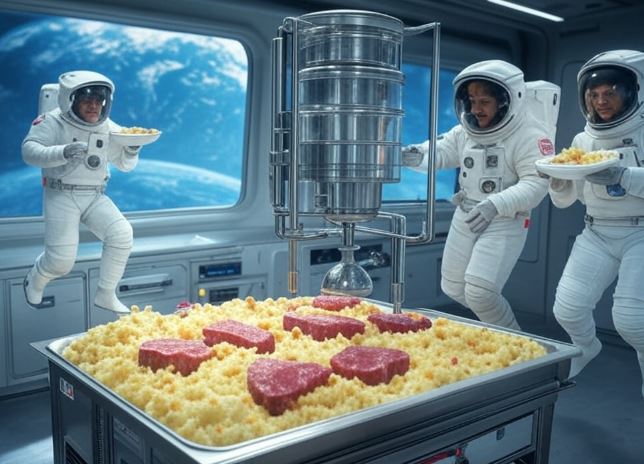Imagine savoring a 3D-printed steak or protein-packed mashed potatoes while floating in space. This culinary vision is now one step closer to reality as European researchers launch a pioneering experiment to produce lab-grown food in orbit. In a mission blending NASA ambition with Top Chef creativity, a compact bioreactor is now circling Earth, testing whether food can be cultivated beyond our planet.
Led by Frontier Space and Imperial College London, this project marks Europe’s first foray into orbital food production. The tiny bioreactor, packed with cutting-edge technology, is designed to grow nutrient-rich foods like lab-engineered meats and fortified starches. The aim is to revolutionize space nutrition, slashing the staggering $20,000 daily cost of feeding astronauts and ensuring healthier diets for long-term missions to the Moon, Mars, and beyond.
Also Read: Can Your Brain Beam Light? Scientists Launch $1.5M Study to Find Out
“This is about more than feeding astronauts,” said Dr. Maria Alvarez, lead scientist at Imperial College. “We’re laying the groundwork for sustainable food systems for future space colonies.” The experiment could also transform life on Earth, offering solutions for food scarcity in remote or resource-poor regions.
The bioreactor’s success hinges on its ability to replicate Earth-based lab-grown food techniques in microgravity. If it works, orbital food factories could become a reality, producing everything from dumplings to steaks tailored for space. The project has already sparked excitement among space agencies and food tech innovators alike.
As the bioreactor hums in orbit, the world awaits results that could redefine dining among the stars—and bring space cuisine to new heights.
Key Points: Space Steaks & Dumplings
- Orbital Experiment: European researchers launched a bioreactor into space to test lab-grown food production, a first for Europe.
- Collaboration: Frontier Space and Imperial College London lead the mission to develop food for astronauts and future space colonies.
- Food Types: The project focuses on producing nutrient-rich foods like lab-grown meats and fortified starches, such as 3D-printed steaks and protein-packed mashed potatoes.
- Cost Reduction: Aims to cut the $20,000 daily cost of feeding astronauts by creating sustainable food systems in orbit.
- Long-Term Goals: Seeks to improve nutrition for extended space missions to the Moon, Mars, and beyond.
- Earth Applications: Technology could address food scarcity in remote or resource-poor regions on Earth.
- Technical Challenge: The bioreactor must replicate Earth-based food cultivation techniques in microgravity to succeed.



